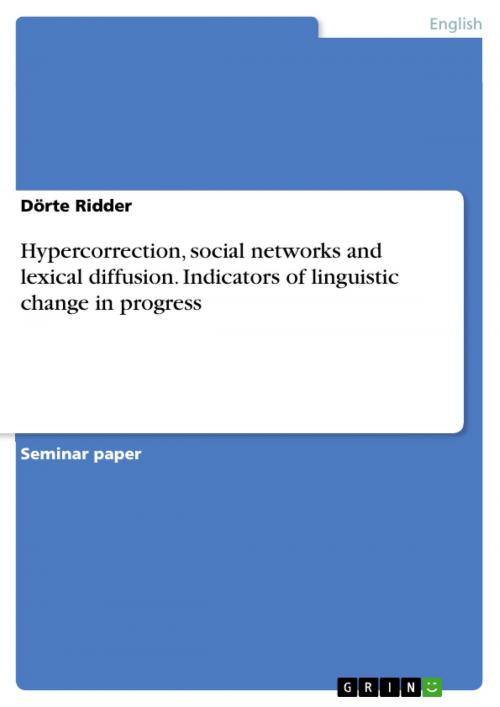Hypercorrection, social networks and lexical diffusion. Indicators of linguistic change in progress
Indicators of linguistic change in progress
Nonfiction, Entertainment, Drama, Anthologies| Author: | Dörte Ridder | ISBN: | 9783638808927 |
| Publisher: | GRIN Publishing | Publication: | February 20, 2007 |
| Imprint: | GRIN Publishing | Language: | English |
| Author: | Dörte Ridder |
| ISBN: | 9783638808927 |
| Publisher: | GRIN Publishing |
| Publication: | February 20, 2007 |
| Imprint: | GRIN Publishing |
| Language: | English |
Seminar paper from the year 2004 in the subject English Language and Literature Studies - Linguistics, grade: 2,1, University of Sunderland (English Department), course: English Past and Present, 11 entries in the bibliography, language: English, abstract: 'English is changing today and [...] you can watch the changes happening around you' (Bauer 1). Languages have never been and will never be invariable facts. Instead, they are subject to natural changes. People are normally unconscious of the linguistic factors that lead to a change and have no control over them. These changes never happen suddenly or randomly without the possibility of tracing their origin, or, at least assessing what might have been their trigger. The leading question in this essay is how the linguistic phenomena of hypercorrection, social networks and lexical diffusion fit into the broader context of linguistic change in progress.
Seminar paper from the year 2004 in the subject English Language and Literature Studies - Linguistics, grade: 2,1, University of Sunderland (English Department), course: English Past and Present, 11 entries in the bibliography, language: English, abstract: 'English is changing today and [...] you can watch the changes happening around you' (Bauer 1). Languages have never been and will never be invariable facts. Instead, they are subject to natural changes. People are normally unconscious of the linguistic factors that lead to a change and have no control over them. These changes never happen suddenly or randomly without the possibility of tracing their origin, or, at least assessing what might have been their trigger. The leading question in this essay is how the linguistic phenomena of hypercorrection, social networks and lexical diffusion fit into the broader context of linguistic change in progress.















